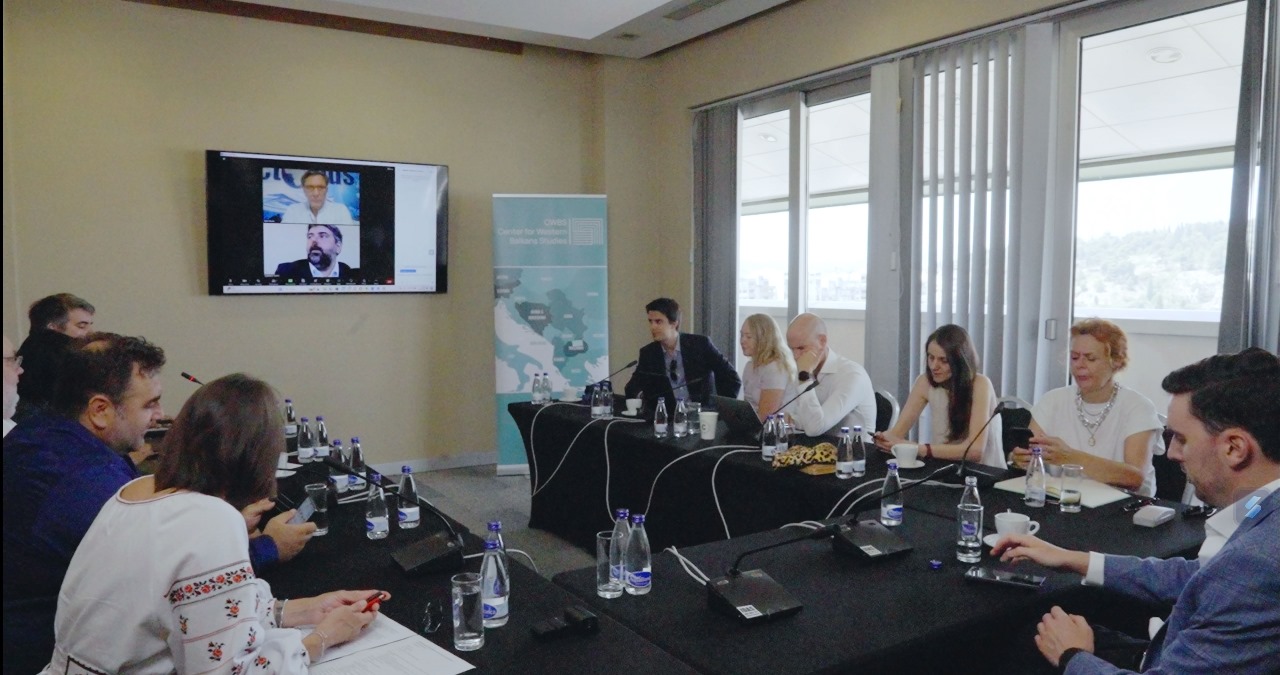The Center for Western Balkan Studies (CWBS) organized in Podgorica a round table, entitled “Hybrid Influences in Southeast Europe”, bringing together international experts to discuss the current challenges for the stability of the Western Balkans.
Leading experts from different countries took part in the discussion, sharing their assessments of the situation, specific examples of destructive hybrid influence, and outlooks for further developments.
Experts agree that the Western Balkans are facing serious hybrid threats that require a coordinated response from the international community. The need for joint efforts in countering hybrid threats was underlined, taking note of the experience gained by different countries and regions.
Agim Musliu: Ethnic tension around the Ibar bridge
Agim Musliu, Director of Octopus Institute in Pristina, spoke about a specific case of hybrid confrontation using the example of the bridge over the Ibar in Mitrovica, which has become a symbol of ethnic division. Musliu emphasized that this split often leads to tension and conflict, as the bridge is used as a physical and symbolic barrier between the two communities.
“The bridge can be used for political violence, protests, blockades, or other violent actions. Any destabilization of the region can bring broader political consequences, especially in the context of relations between Serbia and Kosovo,” Musliu noted.
Balša Božović: Unjust peace in Ukraine as a threat to the Western Balkans
Balša Božović, President of the Regional Academy of Democratic Development in Belgrade, emphasized that achieving an unjust peace in Ukraine would pose a threat to the Western Balkans. The expert believes that in this case, efforts would be made to resolve the Kosovo issue the same way.
He expressed fears that the same solutions may be proposed for Ukraine and the Western Balkans, where “no one would be totally guilty and no one would be totally dissatisfied.” Bozovic emphasized that such an approach could lead to the permanent dominance of the aggressor.
Momčilo Radulović: Russian hybrid influence and the need for Western countermeasures
Momčilo Radulović, head of the European Movement of Montenegro, shared his thoughts on the system of Russian hybrid influence that exists in the Western Balkans and across the wider region of Europe. He described it as flexible system that is quickly learning, being able to outsmart Western protection systems.
“We are talking about a ‘squid’ made of the state, para-state, para-institutional, and para-ideological structures that exert on the part of Russia various types of influence on all continents, including the Western Balkans,” said Radulović. He argued that the main problem is not so much the actual Russian influence but the lack of effective countermeasures that should be taken by the West.
Danilo Kalezić: Russia is destabilizing Montenegro
Danilo Kalezić, a senior researcher at the Institute of History of Montenegro, focused on destabilization strategies Russia is applying in Montenegro. He explained that Russia utilizes two policy concepts: stabilization (Serbia) and destabilization (Montenegro until 2020).
As an example, Kalezić cited the two main risks. One is related to the reformatting of the Montenegrin government that could take on board former leaders of the Democratic Front – a political force whose representatives were accused of the 2016 coup d’état. Another risk is related to plans to restore the chapel of the Serbian Orthodox Church in Lovčeni, which may contribute to the strengthening of Greater Serbian nationalism and domestic destabilization.
“Destabilization will contribute to the deepening of Russian influence,” Kalezić emphasized.
Sergii Morugin: Russian culture as a hybrid warfare weapon
Serhiy Moruhin, co-founder of the Balkan Observer media project, noted that in a hybrid war, nothing gets left out, including culture, although Russian culture remains popular in the Western Balkans. The expert cited specific examples of how it was exploited to achieve political goals, including compromising Ukrainian historical figures and promoting anti-Ukrainian and anti-European sentiments.
The event was moderated by Ljubomir Filipović and Natalia Ishchenko (CWBS).
Ljubomir Filipović noted the lack of knowledge about Ukraine, its history and culture in the region. Such awareness is required to better understand the foundations of the ongoing Russo-Ukrainian conflict and counter Russian narratives.
Natalia Ishchenko emphasized that more effective resistance to destructive hybrid influences, whatever they target, will contribute to stability and peace both within the region, across Europe, and in the rest of the world.


